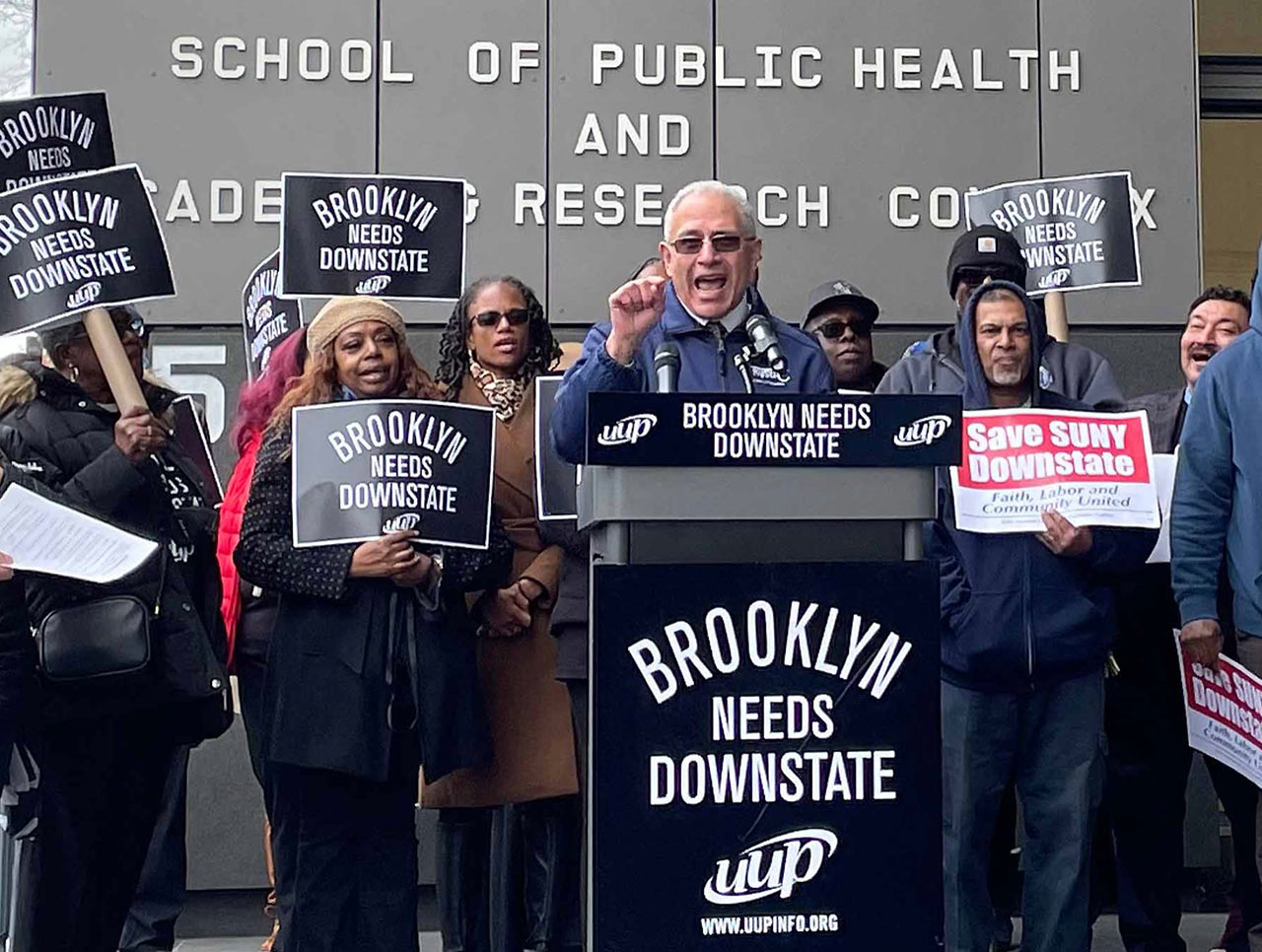SUNY’s three teaching hospitals need a cash injection to stay strong
UNY’s three public teaching hospitals, SUNY Downstate Health Sciences University, Upstate Medical University and Stony Brook University Hospital are on the brink of a financial crisis. NYSUT and United University Professions are calling on Gov. Kathy Hochul and lawmakers to allocate $175 million to restore them to fiscal health.

COURTESY OF AFT
NYSUT President Andy Pallotta, a proud Brooklynite, says he knows that “Brooklyn LOVES SUNY Downstate.”
“SUNY Downstate is a true community lifesaver for a reason: Our highly trained union members turn no one away and treat the most vulnerable members of our community, even if patients can’t afford to pay,” said UUP President Fred Kowal. “Patients with difficult, rare or hard-to-treat medical conditions are often sent to Downstate.”
At the same time, Kowal said, Downstate’s medical university trains the next generation of health care workers, many of whom stay in New York after graduating. “The state must act now to restore the necessary funding to stabilize SUNY Downstate and give it a strong future.”
“Our public teaching hospitals deliver extraordinary care to thousands of New Yorkers every year,” said NYSUT President Andy Pallotta. “And yet, every year we see state funding threatened for these critically important institutions.”
Of the three hospitals, SUNY Downstate is the most cash-strapped, and $133 million of the requested total would be used to cover this year’s operating deficit and maintain services. SUNY Downstate holds a special place in the state system and in New York City’s health care system. It is Brooklyn’s only academic medical center and has served the borough since 1860.
“After holding more than a dozen rallies in 2013 and 2014 to save jobs at our hospital and to save the hospital itself from being closed or privatized, we once again stand strong as we call on the state to do what’s right for SUNY Downstate,” said UUP Downstate Chapter President Redetha Abrahams-Nichols. “We were there for New York during the pandemic. Now, it’s time for the state to be there for Downstate.”
Downstate’s teaching hospital is a vital pipeline of doctors and medical staff to New York City. The university educates 2,000 students annually, the majority of whom are students of color who will stay in New York upon graduation and work in health care.
SUNY Downstate is also a safety net hospital in one of the most critically underserved, low-income communities in New York City. Each year, the hospital staff care for 400,000 patients; 85 percent of the hospital’s patients are uninsured or on Medicaid or Medicare, which underpays the hospital for its services.
Over the last decade, state and federal aid have lagged, putting this already-disadvantaged hospital on even shakier ground. “State funding to our hospitals has dropped by $515 million between 2011 and 2019, and cuts to federal Medicaid Disproportionate Share Hospital payments have further diminished the hospital’s finances,” said Kowal.
Enter COVID-19. In March 2020, then-Gov. Andrew Cuomo designated SUNY Downstate as New York City’s first COVID-only facility, putting this teaching hospital at the epicenter of the pandemic. This was the latest in a long line of unfunded mandates handed down by the state, but the directive cut deep. Between unexpected costs due to the pandemic and a dramatic decrease in revenue, the facility lost millions of dollars.
“The hospital lost the ability to do any other procedures as a COVID-only hospital including those that produced revenue,” said Sam Marquez, a Downstate faculty member. Now, even with the COVID-only designation lifted, the mandate continues to cost the hospital money. “Some patients have avoided Downstate because it used to be a COVID-only facility,” he said.
The state’s three teaching hospitals are all suffering from years of budget cuts and austerity measures, but Downstate is in an especially precarious position, Marquez said.
“If Downstate doesn’t get the $133 million, the hospital will have a very hard time providing necessary health care services its patients depend on, making a bad situation even worse,” he said.
It’s up to the state to deliver the funds the hospitals — and patients — desperately need.
“It is time to invest in our doctors, nurses and health care professionals of tomorrow,” Pallotta said, “so that our children, grandchildren and future generations continue to receive the highest quality care.”